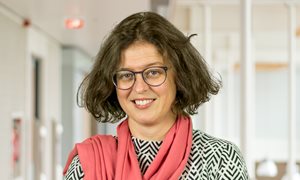 My name is Iris Nagtegaal, I am Dutch, Professor of Gastrointestinal Pathology of the Department of Pathology and proud leader of the Research theme Tumors of the digestive tract!
My name is Iris Nagtegaal, I am Dutch, Professor of Gastrointestinal Pathology of the Department of Pathology and proud leader of the Research theme Tumors of the digestive tract!
When you were a kid what did you want to be when you grew up? Can you tell us something about your child years.
Slightly unrealistic, I really wanted to become participant at the Olympic Games, and spent most of my time during my childhood training for the 100 and 200 m (athletics), which was great fun, although it obviously did not result in any of the big gold medals.
What was your previous academic training, where did you study and why that study?
I studied Biomedical Sciences at Leiden University, which I really liked, because of the multidisciplinary approach, the practical science skills and the relative small groups of students. During my third year people suggested that I would study Medicine as a second topic, since that would open new opportunities for clinical research. Subsequently, I discovered pathology, initially as a PhD student and later on as a resident: this is really the best job in the world! In pathology you are really at the cross-section between science and patient care, as the English say: “Pathology = the science behind the cure”.
The RIMLS motto is: ‘Today’s molecules for tomorrow’s medicine’. What does this mean for you?
It fits quite nicely with what I try to achieve, although my research scope is broader than molecules alone: cells and tissue are also very important and part of me feels also at home at the RIHS and their motto: Science for care, care for science.
Who is your great example as scientists? And please give a motivation why.
For me: Cuthbert Dukes. The title of my inaugural lecture was also inspired by him (The significance of the unusual). He became a gastrointestinal pathologist, almost 100 years ago, in the time before molecular diagnostics and immunohistochemistry. Due to simple observations, he made very important discoveries, including Dukes cancer staging system (still in use for colorectal cancer and bladder cancer, although renamed), adenoma-carcinoma sequence (basis for the Vogelgram from Bert Vogelstein), identification of high risk patients (hereditary bowel cancer/polyposis, inflammatory bowel disease) and he was a great advocate of multidisciplinary meetings, decades before this became mandatory.
Which research discovery that you have made has made you most proud?
During my PhD we were the first to describe a method by which pathologist could evaluate the quality of resection for rectal cancer, and we also proved that this method had prognostic impact. Currently, this has become a standard evaluation all over the world, which always makes me proud, because once we have a method to determine quality, the overall quality of the procedure increases and this actually saves lives.
Given unlimited finance what experiment would you perform?
I would like to perform large scale molecular studies in large cohorts of patients in order to determine what really happens during metastasis. Small studies are available that prove this concept, but due to their size, we do not know whether these concepts are really true and could be widely used for patient care.
What does your working area (desk, office) look like and what does it say about you (or your research)?
A very happy place with lots of pictures & personal stuff and, of course, my microscope. This illustrates that I love my job, and also have a good balance in life!
Nominate a colleague to be in the spotlight and what would you like to ask him or her?
I would like to nominate Marcel Verheij, he recently moved to the Radboudumc from the AvL and I wonder what his first impressions are?
What type of person are you, quick insights:
a) Mac or PC? : PC (but do have iphone)b) Theater or cinema? : Netflix!
c) Dine out or dine in? : Outside dining (can be on my own roof terrace)
d) Ferrari or Fiat? : Gazelle
e) Shopaholic or chocoholic? : Chocoholic! (some PhDs try to take advantage of that!)
f) Culture or Nature : Nature
Related news items

Fewer cancer diagnoses during the COVID-19 epidemic in the Netherlands
7 May 2020 In a commentary in Lancet Oncology Iris Nagtegaal, theme Tumors of the digestive tract, published, together with Thijs Merkx, as head of the IKNL, the latest data that illustrate the impact of the pandemic on the detection of new cancer patients. go to page
Awarded KWF grants for Radboudumc researchers
18 December 2019 KWF is investing 2.7 million euros in five different studies at Radboudumc. The awards are part of the new round of funding by DCS, in which over 34 million euros will be granted to Dutch cancer research. We congratulate our researchers with this funding and wish them success with their great work. go to page
Lieneke Steeghs about the PATH project: Predictive Analysis for Therapy
22 March 2019 Read here the article 'PATH makes predictive molecular diagnostics in cancer unambiguous', of Lieneke Steeghs, theme Tumors of the digestive tract, that was published on the website of ZonMw. go to page
Valentine’s day spectacle at the Radboud Research Rounds
21 February 2019 This year’s Valentine’s day in the Radboudumc was focused on the RRR of the Tumors of the Digestive Tract. In the biannual Paper Award session the big prize went to Daniel Garza from the Center for Molecular and Biomolecular Informatics, for his paper on “the environmental metabolome”. go to page
Christine Mohrmann stipendium for Nikki Knijn
11 December 2018 The goal of the stipendium is to enable junior female scientists to perform research abroad and to encourage them to pursue a scientific career in academia. go to page
Science QUIZ theme Tumors of the digestive tract a big success!
26 November 2018All PhDs sent in a quiz question about their projects and explained the right answer in a one minute pitch. The overall winner was Elise de Savornin Loman from the department of Surgery.
go to page